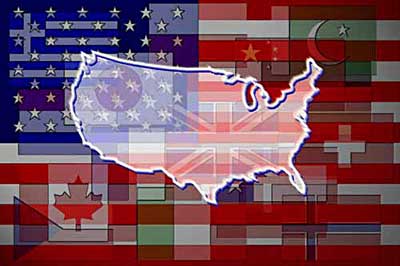10d. Citizenship Rights

The INS is charged with handling all immigration cases and issues within the United States, including the Border Patrol. It is a branch of the Department of Justice.
All countries have rules that determine who is a citizen, and what rights and responsibilities come with citizenship. In the United States, the 14th Amendment gives constitutional protection of the basic rights of citizenship: "All persons born or naturalized in the United States, and subject to the jurisdiction thereof, are citizens of the United States and of the States wherein they reside." So citizenship is conferred on the basis of place of birth and the process of naturalization.
Native-born Citizens
Any individual born within the boundaries of the United States or its territories is eligible for citizenship. If a foreign woman travels to the United States and gives birth to the child before leaving, the child is an American citizen, but the mother is not. Also, children born to American citizens abroad are also native-born citizens. The Constitution affords but one advantage to native-born citizens over those who are naturalized — the right to run for President of the United States. People may have dual citizenship — being citizens of two countries — if they are born to parents living outside the United States, or if they born in the United States to foreign citizens.
Citizenship by Naturalization

The American Immigration Law Foundation fights for immigrants' rights in the United States and advocates continued immigration as healthy for the society and economy.
Naturalization is the conferring of citizenship to an alien — a non-citizen living in the United States. An applicant for citizenship must be at least 18 years old, must be able to read, write, and speak English, and must have lived in the United States for five continuous years, or three years of he or she is married to a citizen. An alien must file a petition requesting citizenship. The Immigration and Naturalization Service then holds a hearing in which the applicant is asked about his or her background and character. The applicant must also answer questions about American government and history. If the application is successful, the individual attends a final hearing to swear an oath of allegiance to the laws and Constitution of the United States.
Loss of Citizenship
Americans may lose their citizenship in three ways:
- Expatriation, or giving up one's citizenship by leaving the United States to live in and becoming a citizen of another country
- Punishment for a federal crime, such as treason
- Fraud in the naturalization process
Admission to the United States
The United States has long been known as a haven for immigrants — a place people come to seek a better life. However, some Americans believed and still believe that too many people are crowding the United States and that immigrants will dilute American traditions and values. Throughout American history, debates have flared among those wishing to open the borders and those wishing to close them.

The concept of the "Great American Melting Pot" is that the American people have been created from diverse groups of immigrants forming a culture with a unique character.
Congress has the power to regulate immigration by setting restrictions on who may be admitted to live in the United States. Until the late 19th century, no limitations were in place. The first immigration limitation acts were passed in the late 1800s, and eventually quotas — or limits — were placed on how many people could come from each country. During the 1960s quotas from individual countries were eliminated, but Congress does set a ceiling — 675,000 as of February 2021 — on the number of immigration visas granted each year.
The Rights of Aliens
The wording of the Constitution allows aliens to have many constitutional rights. The founders referred most often to "persons" rather than "citizens," and so the Supreme Court has allowed aliens the following rights:
- Property ownership
- Business ownership
- Enrollment in public schools
- First Amendment freedoms
- Due process rights

The Elian Gonzalez case put illegal immigration into the United States in the spotlight. Of the millions who wish to enter the country, who should be allowed to stay?
With these rights come responsibilities, so aliens must pay taxes. They are not allowed to vote, they can not hold public office, and, unlike citizens, they may be deported from the United States. A very controversial provision of the 1996 Immigration Act denied and permitted states to deny most welfare benefits to illegal aliens, with the exceptions of emergency medical care, disaster relief, and some nutrition programs.
All United States citizens are protected by the Bill of Rights and the Constitution, as well as by the state and national laws. Even though laws govern overall immigration and residents from other countries must go through the naturalization process in order to become citizens, many rights extend to aliens as well.







